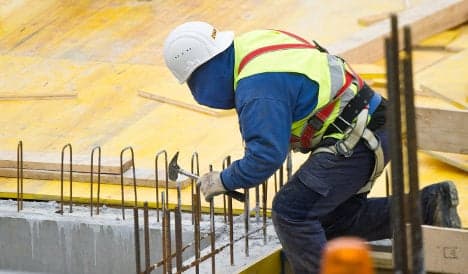EU reports widespread abuse of migrant workers

A report published on Tuesday documents appalling conditions for migrant workers in the EU. In Germany the construction sector was singled out for blame.
The European Union Agency for Fundamental Rights (FRA) came to its conclusions after conducting around 600 interviews with trade unions, police, and representatives of the supervisory authorities.
The agency believes that starvation wages, the removal of passports and being cut off from the outside world are all commonplace forms of exploitation of a migrant workforce which has come from outside the EU.
“Foreign work forces are at serious risk of being exploited in the EU,” said Blanca Tapia of the FRA.
Every fifth interviewee came across instances of exploitation at least twice a week, it is claimed in the report. Some of the affected people were earning one Euro per hour or less and worked for six or seven days a week without a contract.
Germany which is one of only four European countries which offers the same protection to non-EU workers as EU-citizens, was criticized for standards in its construction sector.
The prevalence of subcontractors in the sector meant that workers were particularly at risk, the report argued.
The Federal Republic was also criticized for the lack of clarity on which agency is responsible for tackling exploitation of immigrant labour.
“Nobody takes responsibility,” said Albin Dearing of the FRA.
But the report did not go into numbers of people being exploited in Germany or in the EU as a whole.
“These crimes happen behind closed doors,” explained Tapia. “No one can know exact numbers.”
It was instead the aimed at identifying the causes of exploitation and the types of people most vulnerable.
The FRA called for stronger laws and better oversight. They also recommended a seal which would indicate whether a product had been created in conditions free from exploitation.
Comments
See Also
The European Union Agency for Fundamental Rights (FRA) came to its conclusions after conducting around 600 interviews with trade unions, police, and representatives of the supervisory authorities.
The agency believes that starvation wages, the removal of passports and being cut off from the outside world are all commonplace forms of exploitation of a migrant workforce which has come from outside the EU.
“Foreign work forces are at serious risk of being exploited in the EU,” said Blanca Tapia of the FRA.
Every fifth interviewee came across instances of exploitation at least twice a week, it is claimed in the report. Some of the affected people were earning one Euro per hour or less and worked for six or seven days a week without a contract.
Germany which is one of only four European countries which offers the same protection to non-EU workers as EU-citizens, was criticized for standards in its construction sector.
The prevalence of subcontractors in the sector meant that workers were particularly at risk, the report argued.
The Federal Republic was also criticized for the lack of clarity on which agency is responsible for tackling exploitation of immigrant labour.
“Nobody takes responsibility,” said Albin Dearing of the FRA.
But the report did not go into numbers of people being exploited in Germany or in the EU as a whole.
“These crimes happen behind closed doors,” explained Tapia. “No one can know exact numbers.”
It was instead the aimed at identifying the causes of exploitation and the types of people most vulnerable.
The FRA called for stronger laws and better oversight. They also recommended a seal which would indicate whether a product had been created in conditions free from exploitation.
Join the conversation in our comments section below. Share your own views and experience and if you have a question or suggestion for our journalists then email us at [email protected].
Please keep comments civil, constructive and on topic – and make sure to read our terms of use before getting involved.
Please log in here to leave a comment.